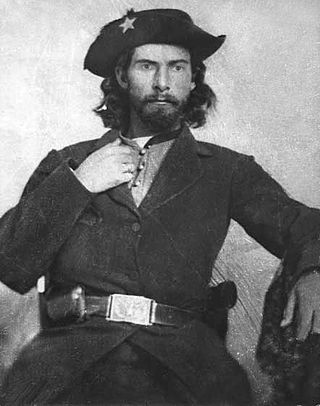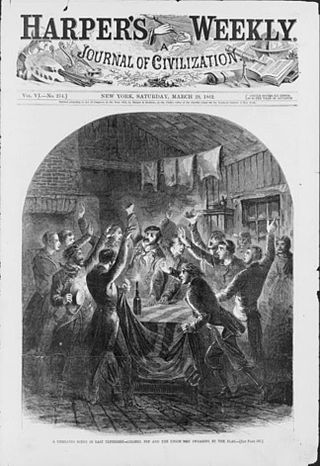
The American Civil War was a civil war in the United States between the Union and the Confederacy, formed by states that had seceded from it. The cause of the war was the dispute over whether slavery would be permitted to expand into the western territories, leading to more slave states, or be prevented from doing so, which many believed would place slavery on a course of ultimate extinction.

The Confederate States of America (CSA), commonly referred to as the Confederate States, the Confederacy, or the South, was an unrecognized breakaway republic in the Southern United States that existed from February 8, 1861, to May 9, 1865. The Confederacy comprised eleven U.S. states that declared secession and warred against the United States during the American Civil War. The states were South Carolina, Mississippi, Florida, Alabama, Georgia, Louisiana, Texas, Virginia, Arkansas, Tennessee, and North Carolina.
1862 (MDCCCLXII) was a common year starting on Wednesday of the Gregorian calendar and a common year starting on Monday of the Julian calendar, the 1862nd year of the Common Era (CE) and Anno Domini (AD) designations, the 862nd year of the 2nd millennium, the 62nd year of the 19th century, and the 3rd year of the 1860s decade. As of the start of 1862, the Gregorian calendar was 12 days ahead of the Julian calendar, which remained in localized use until 1923.

Thomas Michael Keneally, AO is an Australian novelist, playwright, essayist, and actor. He is best known for his non-fiction novel Schindler's Ark, the story of Oskar Schindler's rescue of Jews during the Holocaust, which won the Booker Prize in 1982. The book would later be adapted into Steven Spielberg's 1993 film Schindler's List, which won seven Academy Awards, including Best Picture.

The Confederate States Navy (CSN) was the naval branch of the Confederate States Armed Forces, established by an act of the Confederate States Congress on February 21, 1861. It was responsible for Confederate naval operations during the American Civil War against the United States's Union Navy.

The Confederate States Army, also called the Confederate Army or the Southern Army, was the military land force of the Confederate States of America during the American Civil War (1861–1865), fighting against the United States forces to win the independence of the Southern states and uphold and expand the institution of slavery. On February 28, 1861, the Provisional Confederate Congress established a provisional volunteer army and gave control over military operations and authority for mustering state forces and volunteers to the newly chosen Confederate president, Jefferson Davis. Davis was a graduate of the U.S. Military Academy, and colonel of a volunteer regiment during the Mexican–American War. He had also been a United States senator from Mississippi and U.S. Secretary of War under President Franklin Pierce. On March 1, 1861, on behalf of the Confederate government, Davis assumed control of the military situation at Charleston, South Carolina, where South Carolina state militia besieged Fort Sumter in Charleston harbor, held by a small U.S. Army garrison. By March 1861, the Provisional Confederate Congress expanded the provisional forces and established a more permanent Confederate States Army.

Daniel Edgar Sickles was an American politician, soldier, and diplomat.

The Irish Confederate Wars, also called the Eleven Years' War, took place in Ireland between 1641 and 1653. It was the Irish theatre of the Wars of the Three Kingdoms, a series of civil wars in the kingdoms of Ireland, England and Scotland – all ruled by Charles I. The conflict had political, religious and ethnic aspects and was fought over governance, land ownership, religious freedom and religious discrimination. The main issues were whether Irish Catholics or British Protestants held most political power and owned most of the land, and whether Ireland would be a self-governing kingdom under Charles I or subordinate to the parliament in England. It was the most destructive conflict in Irish history and caused 200,000–600,000 deaths from fighting as well as war-related famine and disease.
The most common name for the American Civil War in modern American usage is simply "The Civil War". Although rarely used during the war, the term "War Between the States" became widespread afterward in the Southern United States. During and immediately after the war, Northern historians often used the terms "War of the Rebellion" and "Great Rebellion", and the Confederate term was "War for Southern Independence", which regained some currency in the 20th century but has again fallen out of use. The name "Slaveholders' Rebellion" was used by Frederick Douglass and appears in newspaper articles. "Freedom War" is used to celebrate the war's effect of ending slavery.

Bushwhacking was a form of guerrilla warfare common during the American Revolutionary War, War of 1812, American Civil War and other conflicts in which there were large areas of contested land and few governmental resources to control these tracts. This was particularly prevalent in rural areas during the Civil War where there were sharp divisions between those favoring the Union and Confederacy in the conflict. The perpetrators of the attacks were called bushwhackers. The term "bushwhacking" is still in use today to describe ambushes done with the aim of attrition.
The trans-Mississippi theater of the American Civil War was the scene of the major military operations west of the Mississippi River. The area is often thought of as excluding the states and territories bordering the Pacific Ocean, which formed the Pacific coast theater of the American Civil War (1861–1865).
"Brother against brother" is a slogan used in histories of the American Civil War, describing the predicament faced in families in which their loyalties and military service were divided between the Union and the Confederacy. There are a number of stories of brothers fighting in the same battles on opposite sides, or even of brothers killing brothers over the issues.

Georgia was one of the original seven slave states that formed the Confederate States of America in February 1861, triggering the U.S. Civil War. The state governor, Democrat Joseph E. Brown, wanted locally raised troops to be used only for the defence of Georgia, in defiance of Confederate president Jefferson Davis, who wanted to deploy them on other battlefronts. When the Union blockade prevented Georgia from exporting its plentiful cotton in exchange for key imports, Brown ordered farmers to grow food instead, but the breakdown of transport systems led to desperate shortages.

Three Cheers for the Paraclete (1968) is a novel by the Australian author Thomas Keneally. It won the Miles Franklin Award in 1968.

The Cherokee in the American Civil War were active in the Trans-Mississippi and Western Theaters. In the east, Confederate Cherokees led by William Holland Thomas hindered Union forces trying to use the Appalachian mountain passes of western North Carolina and eastern Tennessee. Out west, Confederate Cherokee Stand Watie led primarily Native Confederate forces in the Indian Territory, in what is now the state of Oklahoma. The Cherokee partnered with the Confederacy in order to get funds, as well as ultimately full recognition as a sovereign, independent state.

The 18th North Carolina Infantry Regiment was an infantry regiment raised in North Carolina for service in the Confederate States Army during the American Civil War. It fought mostly with the Army of Northern Virginia.

The East Tennessee bridge burnings were a series of guerrilla operations carried out during the American Civil War by Union sympathizers in Confederate-held East Tennessee in 1861. The operations, planned by Carter County minister William B. Carter (1820–1902) and authorized by President Abraham Lincoln, called for the destruction of nine strategic railroad bridges, followed by an invasion of the area by Union Army forces then in southeastern Kentucky. The conspirators managed to destroy five of the nine targeted bridges, but the Union Army failed to move, and would not invade East Tennessee until 1863, nearly two years after the incident.
1864 (MDCCCLXIV) was a leap year starting on Friday of the Gregorian calendar and a leap year starting on Wednesday of the Julian calendar, the 1864th year of the Common Era (CE) and Anno Domini (AD) designations, the 864th year of the 2nd millennium, the 64th year of the 19th century, and the 5th year of the 1860s decade. As of the start of 1864, the Gregorian calendar was 12 days ahead of the Julian calendar, which remained in localized use until 1923.
Alfred Madison Cate was an American politician, soldier and farmer who served two terms in the Tennessee Senate from 1865 to 1869. A Radical Republican, he generally supported the policies of Governor William G. Brownlow, including ratification of the Fourteenth Amendment to the U.S. Constitution. He served as chairman of the Republican State Central Committee in the late 1860s.
The Mobile campaign was a military campaign of the American Civil War in the western theatre in the Spring of 1865 to take the city of Mobile, Alabama. Opposing forces included the Union Army, and the Confederate Army. Important battles were fought at Spanish Fort and Fort Blakeley.













